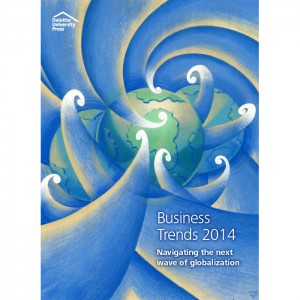 Deloitte, the consulting, risk management and financial services firm, has tackled two current issues in two recent reports: the business next wave of globalization, and how business executives can best demonstrate that their enterprises are creating value for their shareholders.
Deloitte, the consulting, risk management and financial services firm, has tackled two current issues in two recent reports: the business next wave of globalization, and how business executives can best demonstrate that their enterprises are creating value for their shareholders.
Let’s start with, the 134-page Business Trends 2014: Navigating the wave of globalization. This is Deloitte’s second annual business trends report, and asks a vital question: what is going on with the global economy?
The report begins by stating the obvious: “There are many critical uncertainties in the global economy today. The challenging recovery from the financial crisis and subsequent recession in the developed economies, the current slowdown of the BRIC (Brazil, Russia, India, and China) economies, mounting geopolitical tensions, and the continuing rise of ‘back-door’ protectionism are among the more obvious sources of confusion—and concern.”
Then Deloitte gets more specific and identifies “key trends” that are “rooted in longer-term and probably irreversible shifts.”
The trends fall into three categories: “the emergence of a large, new, and unfamiliar consuming class; increased opportunities for collaboration with newly empowered and influential actors; and new sources—and imperatives—of leadership.”
The rise of China—it is now the world’s largest trading nation—and rising GDPs in emerging nations, “state capitalism,” and reductions in the extreme poverty around the world, are changing the globalization lens away from a Western-led focus. “The spread of prosperity and opportunity is welcome and a potential source of long-term growth for enterprises from all parts of the world,” Deloitte says. “But it is also substantially increasing the level of complexity and uncertainty in the business landscape.”
The next wave of globalization trends identified by Deloitte fall into several categories of impact:
– Companies are encountering “deep changes” in the nature of global consumers – including another billion of them, with many of those consumers from emerging economies. More than ever, a one-size-fits-all consumer strategy will not work.
– Then—a subject close to my Vested mindset—there’s “a fascinating shift in how business gets done, focusing on collaboration both inside and outside the walls of the enterprise.” Increasingly, “innovation happens everywhere.”
Deloitte says more businesses will discover “the power of looking beyond their own organizations and their familiar markets for the inspiration for their next products and services. They will recognize that the best use of a toolkit they have been using in marketing communications—social media—is actually to connect and collaborate across many areas of the business and with all manner of stakeholders.”
In addition, companies are paying more attention to the viability of local producers and supply chains. Partnering and collaboration “among global organizations—even among competitors—has become more commonplace as businesses encounter issues that are too large or complex to handle on their own.”
How about an “anticipatory supply chain?” or when it comes to leadership, “given how central global growth is to an organization’s strategies—CFO could equally stand for chief frontier officer.”
My take on the next wave of globalization as described by Deloitte? Vested provides the approach and the tools to ride the wave to long-term success.
Next I’ll look at Deloitte’s report on linking strategy to value.
Image: Deloitte 2014 Business Trends Cover